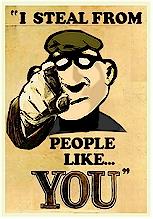What we were discussing was how "fortunate" my sister's landlord was due to the recent passing of an ninety year-old rent-controlled tenant who lived upstairs from my sibling and brother-in-law. One of the points I made during the discussion was how R/C and R/S are in fact the impetus for bitter animosity usually present between landlords and tenants; and it's because of these unethical, WWII-era "emergency" laws that sometimes results in a landlord callously celebrating a human death!
That was the essence of my argument to emotional appeal. After all, it's difficult to win one's septuagenarian grandparents with ethical or economic fact, when all they can picture is what vote-pandering politicians like to paint -- senior citizens being kicked out of their homes and roaming the frozen streets homeless.
In defense of R/S and R/C, my dad and my broker-in-law repeated one another with the ole' canard "You knowingly bought it with the pre-existing R/C or R/S tenants" as if this could repeal the laws of private property and condone property theft.

Feeling like a kindergarten teacher I told them, "Suppose Dennis buys an apple tree from Adam, knowing that everyday a group of gangsters will pass by and take a couple of apples from the tree, does this mean that Dennis is willing to allow for the future apple theft?" Everyone immediately grasped the parallel, but then fell into the mindtrap of legal positivism -- "But its the government that doing rent S/C, not gangsters!" to which I responded "What's the significant difference between those two?".
It's also economic fact that price ceilings results in shortages; which means that even well-intending rent-control laws will benefit the lucky few to the detriment of the many others who will suffer a smaller housing stock consisting of higher rents and house prices.
And finally back to the emotional appeal, I explained to them that only in areas with R/C or R/S (such as NYC and San Francisco) do you find widespread cases of landlords who fight to rid themselves of tenants(!), as opposed to landlords who make it their business to house people; which hopefully made them realize that R/C and R/S are the leading cause of landlords-tenant squabbles and makes the situation worse, not better.










































